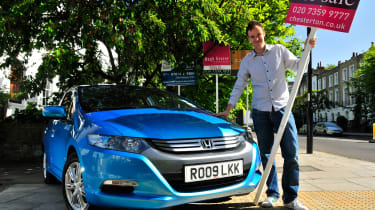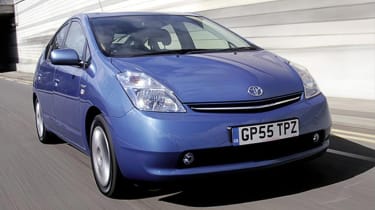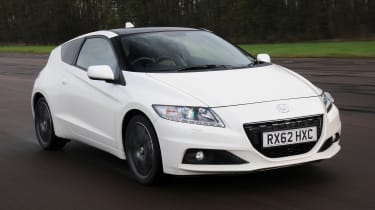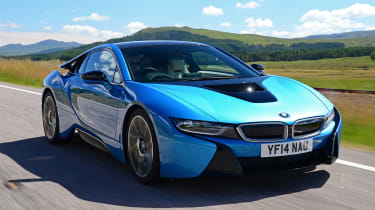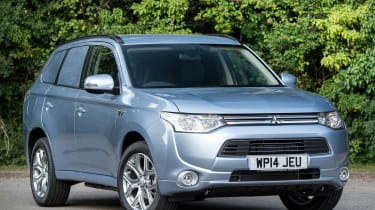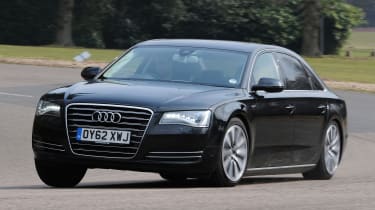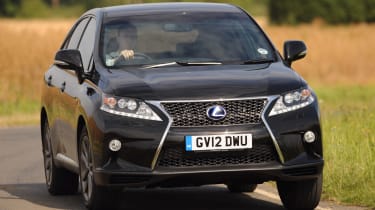With sales of hybrid cars on the rise, is there any reason to be fearful of buying a used hybrid? We assess the pros and cons…
Air quality concerns and testing regime worries mean many owners are shying away from diesels and looking for cleaner alternatives. Makers are under increasing pressure to deliver cars with better efficiency and lower CO2 emissions, and although small petrol turbos are popular, there’s little doubt that hybrids are a growing force.
It’s not a totally new phenomenon, either. While the market share for both plug-in and petrol/electric hybrids has grown over the past 12 months, these cars have been on the market for years. The first-generation Toyota Prius hit UK showrooms back in 2000 and with the Mk4's arrival, it’s fair to say hybrid tech has proven reliable. Some manufacturers have been slower to catch on, but there’s still a whole range of options available on the used market. So, should you consider one as your next motor?
• Best hybrid cars on the market
Hybrid tech may have proven itself worthwhile and dependable, but many potential buyers are still put off due to the perceived extra cost and complexity of the drivetrain. They assume poor reliability is likely, but according to Toyota, the opposite is true. There’s no clutch, conventional starter motor, alternator or drivebelt, plus it says the hybrid system leads to longer durability of brake discs, pads and tyres.
But, of course, it’s the battery pack that has most potential buyers worried. They assume it’s a ticking time bomb, ready to fail and costly to replace. But according to Honda, reliability simply isn’t an issue; it notes that the batteries in the Civic IMA (from 2002) are lasting 10-14 years, while the company has yet to replace a single pack from newer models such as the post-2010 Insight and the Jazz Hybrid offered from 2011.
A Toyota spokesman tells us: “Hybrid components rarely need replacing under the warranty, and we’ve always said they’re designed to last the life of the car. We know the tech is reliable and it works. We still have Mk1 Priuses on the road, so battery durability isn’t an issue; you only need to look at the number of Priuses being used by the private hire sector.”
There’s not much cause for worry on the used market, either, as at this point few makers have been offering hybrids for long. As a result, most of the batteries in models they’ve sold are still under warranty. The length varies from one maker to another; the cars themselves get the standard manufacturer warranty, while the hybrid technology can be covered for up to eight years.
With their batteries still under warranty, most makers have yet to set prices for replacement packs. Mitsubishi UK MD Lance Bradley reckons there’s good news here, though. He says: “Battery pack costs have halved in the past three years, and they’re now a fifth of what they were 10 years ago. By the time these cars are out of warranty – and, more importantly, by the time their battery packs start failing – replacement costs will almost certainly be significantly lower than they are now.”
He continues: “What’s more encouraging, though, is the fact that it’s highly unlikely a whole pack will need renewal, as it’ll simply be a question of replacing any dead cells inside, cutting costs even further. After 10 years you can still expect at least 80 per cent efficiency from a hybrid battery pack; could you say the same about the internal-combustion engine it’s supporting?”
If you do need to replace an entire battery pack, it’s not as costly as you might expect. For a Mk1 or Mk2 Prius, it’s £1,201 and £1,068 respectively on an exchange basis; a new battery for a Mk3 is priced at a hefty £5,730, though. Replacing the pack on an original Honda Insight or Civic IMA will cost you around £2,000, but it’s a more palatable £900 on the later Insight and Civic IMA. In 2012, Honda switched from nickel metal hydride batteries to lithium-ion versions, virtually tripling replacement costs in the process, from £972 to £2,700 – not that any of these batteries have yet needed to be replaced.
Neil Addley runs the trusteddealers.co.uk portal for franchised dealers around the UK. He says: “The numbers of people planning to buy used hybrids is increasing, with nearly seven per cent of those we recently surveyed saying their next car will be one. Fuel prices are also encouraging people to look to such alternative engines. Despite concerns from some in the industry about the longevity of hybrid battery packs, 51 per cent per cent of participants in our survey gave fuel prices as the motivation behind their next vehicle choice.”
With all that in mind, we return to our original question: should you buy a hybrid? Firstly, there’s seemingly no need to fear reliability, so it comes down to whether or not you’ll achieve the improved economy that’s the headline hybrid benefit. The answer depends almost entirely on what type of driving you do. If you generally undertake high-speed, long-distance journeys you’ll see no benefit of the tech, and you’ll probably be frustrated by some models’ relative lack of torque next to a diesel. However, if your trips are more of the low-speed, stop-start variety, a hybrid could save you plenty.
What’s a hybrid like to own?
London-based Daniel Taylor bought a 2005 Toyota Prius two years ago, and has covered 20,000 miles in it since. He says: “I ran an Audi A2 1.6 FSi before. It was incredibly unreliable, and despite its lightweight aluminium construction it wasn’t that frugal.
“On the motorway the Audi did 45-50mpg, but in town this dropped to more like 20mpg. The Prius also gives 45-50mpg on the motorway – but it’s just as frugal around town. This is despite the fact that it’s bigger and more practical, too. I’m 6ft 5in yet can get comfortable, with plenty of room behind me.”
Daniel also tells us he loves the easy driving experience. “The auto box is smooth and makes urban trips simple,” he explains. “My Prius has taken me all over the UK, in comfort and with exceptional reliability. The car came with a full service history, and so far it’s needed only a new 12-volt battery (after seven years), just as any car would.”
A recent ride in a Prius taxi of a similar age has confirmed Daniel’s views on the car’s dependability. He adds: “It had done 202,000 miles. The driver said that the catalytic converter had just failed, but other than it was totally original; it’s not surprising, as these hybrids aren’t as complex as a diesel with their dual-mass flywheels and turbos.
“My Prius has been such a great car that my father bought a nearly new Lexus CT 200h, which he loves.”
How do they compare on running costs?
For £10,000 you can buy a 10-plate Prius Mk3 T Spirit with 60,000 miles. The same amount gets a 30,000-mile Ford Focus 1.6 TDCi or a 20,000-mile 1.6, both on a 63-plate (2013) and in Titanium trim.
As it’s newer, the Ford will lose value at a greater rate than the Toyota, and both need a service every year; the Focus has a 12,500-mile limit, the Prius 10,000. Also, the Ford’s timing belt must be replaced every eight years/87,500 miles, at £500. Otherwise, as our table shows, maintenance costs are similar for the Prius as for a petrol and diesel Focus.
Buy a petrol Ford and you’ll pay more in annual road tax and fuel bills than for a diesel version or a Prius, but your insurance premiums should be lower, which will go some way towards compensating.
| Focus 1.6 | Focus 1.6 TDCi | Prius | |
| Road tax | £130 a year | £20 a year | Free |
| Insurance | Group 7 | Group 15-16 | Group 15-16 |
| Servicing | £200 a year | £200 a year | £200 a year |
| Fuel cost | 47mpg (£965) | 67mpg (£677)* | 72mpg (£630)* |
Six of the best: Used hybrids
The family car: Toyota Prius Mk2 (2003-2009)
It’s the world’s most popular hybrid, with more than 3.5 million global sales including nearly 70,000 in the UK. The Mk2 was the first Prius to offer family hatch practicality, and even now, over a decade later, the batteries are lasting well. It’s dull to drive, but it promises great economy with family car usability at a tempting price.
| Priced from: | £2,500 |
| CO2/road tax: | 104g/km/£10 |
| Official economy: | 65.7mpg |
| Battery warranty: | Five years |
The sports car: Honda CR-Z (2010-2015)
Honda’s built some great sports cars over the years, but when it introduced this hybrid coupe in 2010 it’s fair to say it got a lukewarm reception. That was a shame, as it handled well, looked sharp and was nicely equipped, too. If you’re tempted, buy one with the lithium battery pack (from late 2012); it offers more power.
| Priced from: | £6,000 |
| CO2/road tax: | 117g/km/£20 |
| Official economy: | 56.5mpg |
| Battery warranty: | Five years |
The supercar: BMW i8 (2014-on)
There’s a school of thought that says a supercar must have a gas-guzzling V8, but BMW doesn’t agree. Its carbon fibre i8 packs a 1.5-litre three-cylinder petrol engine, but thanks to hybrid tech it can crack 0-62mph in only 4.4 seconds and tops out at 155mph. It looks amazing and it’s fabulous to drive, too; what’s not to love?
| Priced from: | £75,000 |
| CO2/road tax: | 49g/km/£0 |
| Official economy: | 135mpg |
| Battery warranty: | Eight years |
The crossover: Mitsubishi Outlander PHEV (2014-on)
Look past its bland design and the Outlander should impress. The PHEV was the UK’s first plug-in hybrid to be offered at the same price as the diesel version, and has been a hit due to its range and practicality – even if it trails on refinement and feelgood factor.
| Priced from: | £22,000 |
| CO2/road tax: | 44g/km/£0 |
| Official economy: | 148mpg |
| Battery warranty: | Five years |
The luxury car: Audi A8 (2012-2013)
The hybrid A8 can be bought for around half the price of its hybrid luxury car rival, the Mercedes S400L, and is much rarer; only 191 were sold in the UK before the plug was pulled. Predictably, the big Audi has a roomy, hi-tech cabin, lavish kit levels and peerless build quality – and you could easily spend more on a new A3.
| Priced from: | £26,000 |
| CO2/road tax: | 144g/km/£145 |
| Official economy: | 45.6mpg |
| Battery warranty: | Three years |
The SUV: Lexus RX 450h (2009-2015)
If you don’t fancy splashing out £15k on a used hybrid SUV, there are plenty of first-generation RX 400hs on offer from only £5,000 – but the newer car is better in just about every way. It’s uncannily refined, superbly built, incredibly well equipped, surprisingly fast and astonishingly reliable. Shame it isn’t more enjoyable to drive…
| Priced from: | £15,000 |
| CO2/road tax: | 145g/km/£145 |
| Official economy: | 44.8mpg |
| Battery warranty: | Three years |
Get the latest electric car news, reviews and analysis on DrivingElectric.com
Source: Read Full Article

